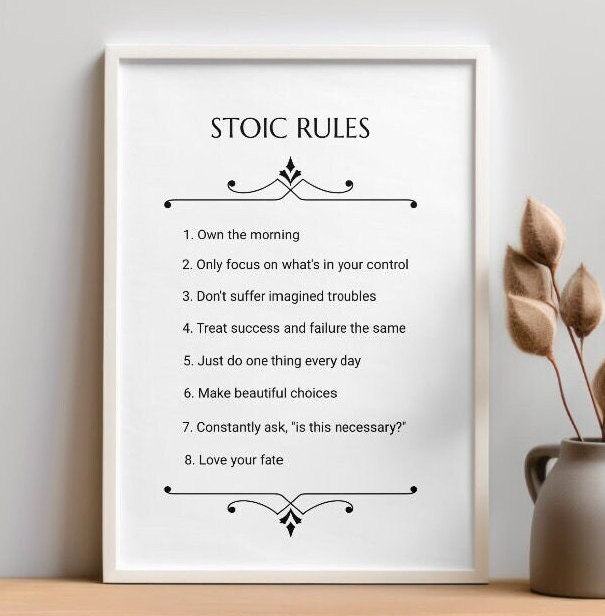7 Stoic Rules To Conquer The Day In today’s fast-paced and often chaotic world, finding purpose and fulfillment can seem like an elusive goal. However, the ancient philosophy of Stoicism offers timeless wisdom that can help us navigate life’s challenges and live each day with intention. By applying Stoic principles to our daily routines, we can cultivate resilience, clarity, and inner peace. This article will explore seven Stoic rules to help you conquer the day and lead a more meaningful life.
1. Start The Day With A Clear Mind
How we begin our day sets the tone for the following hours. To conquer the day like a Stoic, create space for a clear and focused mind. Engage in a morning meditation or reflection practice, allowing yourself to be present in the moment and letting go of yesterday’s concerns and tomorrow’s worries.
Set intentions and goals for the day ahead as you sit in stillness. What do you hope to accomplish? What kind of person do you want to be? By setting a clear direction, you’ll be better equipped to make decisions and take actions that align with your values.
Lastly, embrace the concept of “Memento Mori” – remembering the inevitability of death. This might sound grim, but the Stoics believed that acknowledging our mortality can help us appreciate the preciousness of each day and inspire us to live with purpose and urgency.
2. Focus On What You Can Control
One core tenet of Stoicism is the dichotomy of control – distinguishing between what we can and cannot influence. Many of life’s challenges and frustrations stem from our attempts to control things beyond our power, such as other people’s opinions or the economy.
To conquer the day like a Stoic, direct your energy and attention towards the things within your control, such as your thoughts, actions, and responses to external events. Focusing on what you can change will make you feel more empowered and less prone to stress and anxiety.
When faced with circumstances beyond your control, practice acceptance and adaptability. Rather than resisting or complaining about what you cannot change, ask yourself how to make the best of the situation and find opportunities for growth and learning.
3. Practice Self-Discipline
Self-discipline is the cornerstone of a Stoic lifestyle. It’s the ability to control your impulses, delay gratification, and stay focused on your goals, even when faced with temptations and distractions.
To cultivate self-discipline, start by building willpower and self-control. This can be as simple as resisting the urge to hit the snooze button in the morning or choosing a healthy snack over junk food. As you practice small acts of self-control, you’ll develop the mental strength to tackle more significant challenges.
Next, focus on developing healthy habits and routines that support your goals. Consistency is vital, whether exercising regularly, eating a balanced diet, or dedicating time to learning and personal growth. By making these habits a non-negotiable part of your daily routine, you’ll be better equipped to stay on track and achieve your objectives.
4. Embrace Challenges As Opportunities For Growth
Life is full of obstacles and setbacks, but the Stoics viewed these challenges as opportunities for growth and development. Rather than seeing difficulties as threats or reasons to give up, they embraced them as chances to build resilience, creativity, and strength of character.
Next, focus on developing healthy habits and routines that support your goals. Consistency is vital, whether exercising regularly, eating a balanced diet, or dedicating time to learning and personal growth. By making these habits a non-negotiable part of your daily routine, you’ll be better equipped to stay on track and achieve your objectives.
4. Embrace Challenges As Opportunities For Growth
Life is full of obstacles and setbacks, but the Stoics viewed these challenges as opportunities for growth and development. Rather than seeing difficulties as threats or reasons to give up, they embraced them as chances to build resilience, creativity, and strength of character.
When you encounter a challenge, reframe it as a learning experience. Ask yourself what you can gain from the situation, even if it’s just a chance to practice patience or problem-solving skills. By adopting a growth mindset, you’ll be better equipped to navigate life’s ups and downs with grace and determination.
5. Live By Your Values
The Stoics believed in aligning our actions with our values to live a fulfilling life. This means taking the time to identify and clarify what truly matters to us—whether it’s honesty, compassion, courage, or any other virtue.
Once you’ve identified your core values, use them as a compass to guide your decisions and actions. When faced with a choice, ask yourself which option aligns most closely with your values. By consistently choosing integrity and authenticity, you’ll build self-respect and earn the trust and admiration of others.
Living by your values also means being true to yourself in your interactions with others. Speak your truth, even when difficult, and resist the temptation to compromise your principles for popularity or short-term gains.
6. Practice Gratitude
Gratitude is a powerful tool for shifting perspective and finding contentment in the present moment. The Stoics recognized the importance of appreciating the good in our lives, even in adversity.
To cultivate gratitude, start by recognizing and savoring the simple things—a beautiful sunset, a cup of coffee, or a heartfelt conversation with a friend. By training our minds to notice and appreciate these small joys, we develop a greater sense of contentment and resilience.
Gratitude also extends to our relationships with others. Take time to express your appreciation for the people in your life, whether through words of affirmation, acts of kindness, or quality time together. By nurturing positive relationships and focusing on the good in others, we create a supportive network that can help us weather life’s storms.
7. Reflect On The Day And Learn From Experiences
The Stoics believed in the power of self-reflection and introspection. By reviewing our thoughts, emotions, and actions at the end of each day, we gain valuable insights into ourselves and identify areas for growth and improvement.
As you reflect on your day, ask yourself questions such as:
- Did I act according to my values?
- What challenges did I face, and how did I respond?
- What can I learn from today’s experiences?
- How can I improve tomorrow?
By engaging in this daily practice of self-reflection, we develop greater self-awareness, emotional intelligence, and the ability to learn from our mistakes. Over time, these insights accumulate, leading to profound personal growth and transformation.
Case Study: How Brett Transformed His Life
Brett, a 35-year-old software engineer, was overwhelmed by his career and personal life demands. Despite his success at work, he often felt anxious, unfulfilled, and struggling to find purpose. Determined to make a change, Brett stumbled upon the philosophy of Stoicism and began incorporating its principles into his daily routine.
He started each morning with a quiet meditation, setting intentions for the day and reflecting on what truly mattered to him. Brett also began focusing on the aspects of his life he could control, such as his reactions to challenges and his effort at work, rather than worrying about external factors like his boss’s opinions or the company’s performance.

